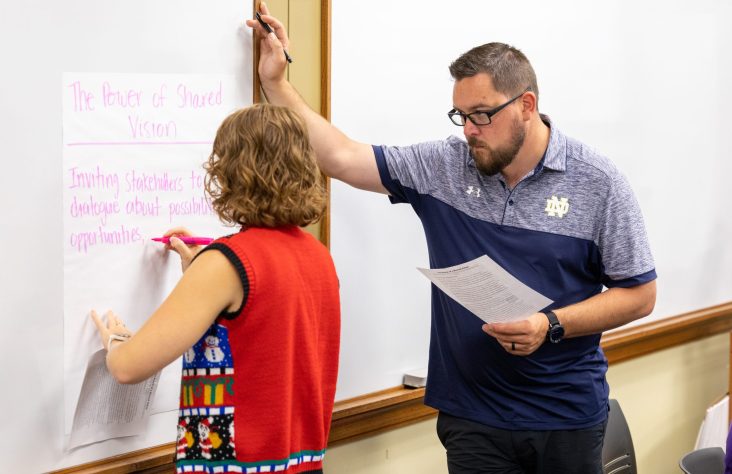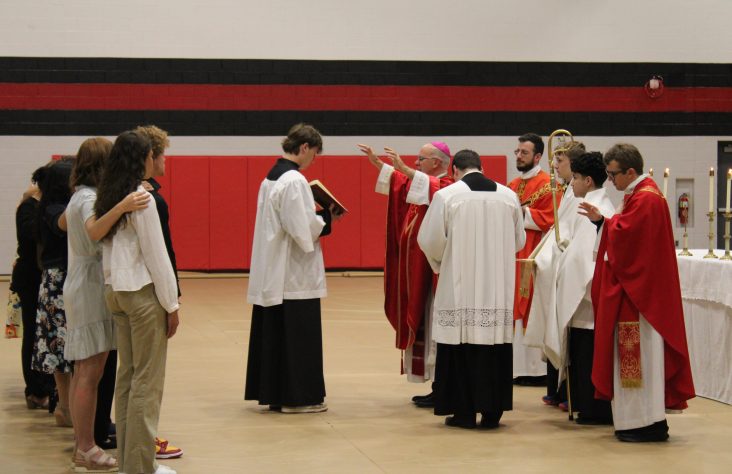November 17, 2021 // Perspective
This Advent, focus on presence, not presents
I ordered our matching Christmas pajamas in early October. Worried about supply chain issues and shipping delays, I picked the Nordic blue print we liked best and bought them 11 weeks early. And then I found Jesse Tree ornaments I liked, so I ordered those too.
Advent candles came soon after, three boxes on sale on Amazon; it just made sense to get them now and set them aside. A new set of Christmas candy canes for the pathway came next, then an inflatable Clark Griswold that my husband still doesn’t know will be sitting in the front yard come Dec. 1.
“Am I ready?” I thought to myself. The gifts are hidden and all the “fixings” are ready to celebrate Advent and Christmas. Menus are prepared. Decorations are at the ready. Nativity sets have a spot on a shelf or mantle. Now we just wait. But is it enough? Are we ready?
I’m willing to admit that my assumption of readiness based purely on having a lot of “stuff” for Advent and Christmas is entirely wrong. And I’m happy to admit that my belief that I’m ready because of having all this stuff has been fueled by this weird belief that we have to do “all the things” to make Advent and Christmas special.
But it isn’t the “stuff” that makes us ready or better prepared to “wait in joyful hope” for the arrival of baby Jesus. And it isn’t the perfect set of Jesse Tree ornaments or pristinely wrapped presents that make the four weeks of Advent and Christmas morning good and fruitful.
Far too often, I’ve fallen into the trap of thinking it is the stuff that makes us ready, makes the holidays and our celebration of them somehow better.
I’ve convinced myself that “liturgical living” has to include products and programs and that what we do as a family has to measure up to some proverbial “Catholic living checklist” created by people watching us from afar.
Social media hasn’t helped this. Scrolling past pictures of perfectly decorated homes and pristinely photographed desserts makes me jealous and competitive. A consumeristic culture convincing us to buy more has only accelerated this misguided approach to Advent and Christmas.
Not fully understanding the gift and meaning of Advent, and why the Church has us slowly build to the birth of Christ, has only hurt any healthy approach to the holidays.
If we can get back to the realization that Advent is fruitful because we have four weeks set aside to focus on hope in God’s promises, peace in God’s plan, joy in God’s providence and love of the Lord and others, then maybe we’ll see it as gift that we have four weeks to slowly prepare for Jesus instead of a competition of liturgical living activities to complete.
If we can remember that it’s the arrival of the newborn king, Emmanuel, that makes Christmas good, then maybe we’ll realize all the other “stuff” (even stuff I’ve frantically purchased and set aside) are just extras, maybe helping make those days better, but certainly not things required or necessary for the seasons we’re approaching to matter.
Rather than fall prey to the belief that we have to do a dozen family devotionals and handcraft our Advent candles from beeswax kits, maybe this Advent season can be one of intentional slowing down and doing more with less.
Maybe this Christmas can be one focused less on presents under the tree and more on the presence of loved ones finally gathered together. Maybe we avoid running the “liturgical living rat race” by recognizing that we’re not in competition with anyone else, and the way they prepare for and live the holidays is not the way we have to do it.
I rushed to buy all the “stuff” because I weirdly believed it would help me be more ready for a liturgical season that seeks to end our rushing and wants to change our misguided perceptions of readiness.
Rushing to have and do all the things and readying stuff to look at and cling to does nothing to help us let Christ rush into our lives and ready our hearts for the kingdom of heaven.
As we get ready for Advent, which begins Sunday, Nov. 28, let’s strive to slow down and intentionally and purposefully look to buy and do less so we can make room for more of the Lord in our lives.
Katie Prejean McGrady is an international author and speaker.
The best news. Delivered to your inbox.
Subscribe to our mailing list today.






